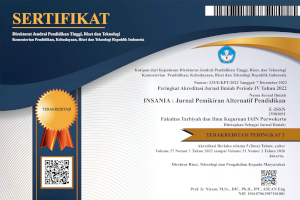Revitalisasi Moral Dalam Pendidikan (Telaah Konsep Pendidikan Moral Ibnu Maskuya)
DOI:
https://doi.org/10.24090/insania.v18i1.1439Abstract
Abstract: Various problems plaguing the education sector today, suspected to be one consequence of eroding, even the loss of a spirit of true morality in education. No doubt that when it is no longer a moral foundation and a principal goal of education, then it is certainly going long tails on the emergence of bigger problems, not only will befall in education its self, but will spread to other dimensions, such as social and politics. Moral revitalization in education is the key word and long-term solutions. Moral education is not only to be one of the functions of education, but more than that morality should be the ultimate goal convening of an education. Because the intellect is not based on morality, has been ascertained only will produce successive generations of “disabilityâ€, which is only going to ruin the social life of the nation. Corruptor is a concrete manifestation of the erosion of the morality of intellectual, our educational products. Than this paper attempts to unravel the true concept of moral education has been touted 11 centuries ago by a leader, named Ibn Maskuya. Keywords : Education, moral, revitalization, Ibn MaskuyaDownloads
Downloads
Published
How to Cite
Issue
Section
License
Authors who publish with this journal agree to the following terms:
Authors retain copyright and grant the journal right of first publication with the work simultaneously licensed under a Creative CommonsAttribution-ShareAlike License that allows others to share the work with an acknowledgment of the work's authorship and initial publication in this journal.
Authors are able to enter into separate, additional contractual arrangements for the non-exclusive distribution of the journal's published version of the work (e.g., post it to an institutional repository or publish it in a book), with an acknowledgment of its initial publication in this journal.
Authors are permitted and encouraged to post their work online (e.g., in institutional repositories or on their website) prior to and during the submission process, as it can lead to productive exchanges, as well as earlier and greater citation of published work (See The Effect of Open Access).








